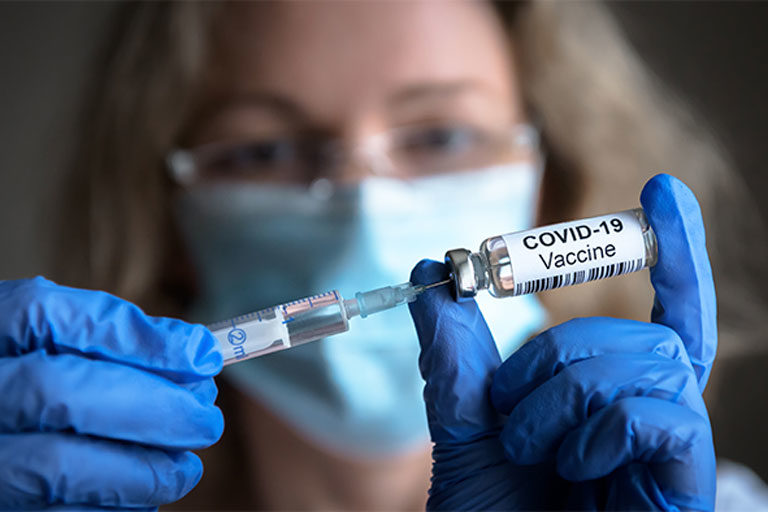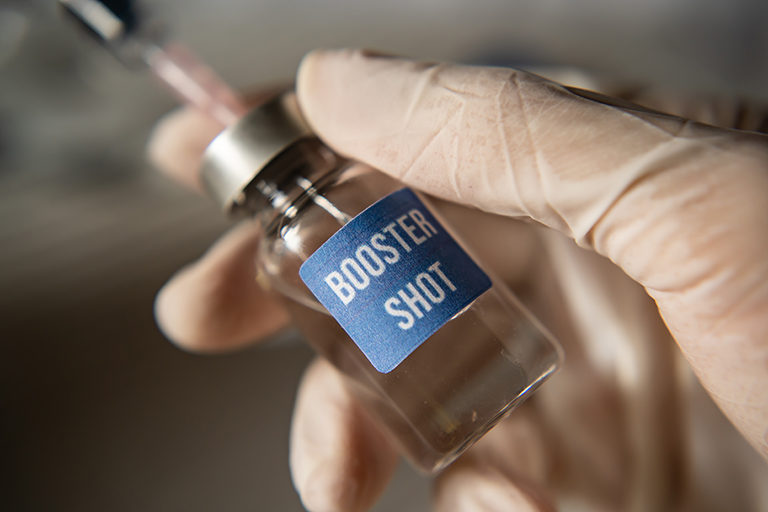
Living Well at Home

Massachusetts has begun to safely distribute the COVID-19 vaccines. Commonwealth Care Alliance (CCA) has closely followed the vaccine development, approval, and delivery timeline. Our team of medical experts are confident that the new vaccines are safe and effective. And we will keep reviewing available information on the vaccine’s ability to protect our members. Getting vaccinated as soon as possible helps make our communities safer for everyone.
We know people have many questions about the COVID-19 vaccine. On this page, you will find answers to some common questions about vaccine safety and side effects. We will update this page as we learn more.
While we are excited to share what we learn with you, the content in this article does not replace a discussion with your doctor or caregivers.
CCA members should look out for information and next steps from us in the mail and from their CCA care team. We are dedicated to keeping you safe and helping you learn about the vaccine.
COVID-19 Vaccine Side Effects
Side effects are normal signs that your body is building protection. Not everyone will have side effects from the vaccines. Side effects can be different for each person and can vary based on which vaccine you’re given. Before you are vaccinated, any potential side effects will be reviewed with you.
Common examples of side effects reported by the CDC include: sore arm, tiredness, headache, muscle aches, and sometimes low-grade fever. Most side effects are mild, and they go away after a few days. For the Pfizer vaccine, more people experienced these side effects after the second shot than after the first shot. If you do have side effects that worry you after receiving your first or second vaccine dose, call your primary care provider to discuss how you are feeling.
The CDC reports that a small group of people have had an allergic reaction like what happens when someone is sensitive to penicillin or bee stings (hives, throat tightness).
The healthcare provider giving the vaccine will monitor you for any reactions for 15–30 minutes after the shot. They are prepared to treat allergic reactions if they occur.
If you’ve had an allergic reaction to a vaccine before or a severe allergic reaction due to any other cause, talk with your primary care provider before receiving the COVID-19 vaccine.
No long-term side effects were found in the vaccine trials for the FDA approved vaccines. All pharmaceutical companies with vaccines approved for emergency use will continue to collect safety and long-term data from participants for a full two years. Other vaccine candidates are under study currently but have not been released to the market yet.
COVID-19 Vaccine Safety
Vaccines go through a lot of testing to prove they are safe. Before a vaccine is approved for use, it is first given to thousands of people to see how they respond to the vaccine. These are called clinical trials.
After clinical trials end, the U.S. Food and Drug Administration (FDA) reviews the results and approves the vaccine for use. Next, the CDC Advisory Committee on Immunization Practices (ACIP) reviews the results and approves the vaccine for use. The FDA and ACIP make sure vaccines are both safe and effective.
The people in the COVID-19 clinical trials were from different age groups and included male and female participants. They also included people from many ethnicities and races. Approximately 20% of the clinical trial participants identified as Black or African American. Having so many participants from different backgrounds has helped to provide positive evidence for the safety and effectiveness of both vaccines.
After the COVID-19 clinical trials, both the FDA and ACIP approved the COVID-19 vaccines for the public. Based on these results, our team of medical experts are confident that the new vaccines are safe and effective. We are not only dedicated to helping our members get vaccinated but are helping our member-facing team members get vaccinated too.
Remember, if you have concerns about the vaccine and your specific health needs, your primary care provider may be able to help. CCA members can also reach out to their care partners for more information.
The pharmaceutical companies and government agencies monitor the ongoing roll-out of the vaccines. There are several safety systems in places. The CDC and FDA collect reports of possible side effects.
There are two ways you can help the CDC and FDA collect information on vaccine side effects:
V-safe: To use V-Safe, you will need a smartphone that can accept text messages and connect to the web.
V-safe texts you a link to a survey every day that asks if you are experiencing any side-effects. Using v-safe, you can quickly tell CDC if you have any side effects after getting the COVID-19 vaccine. Depending on your answers, someone from the CDC may call to check on you and get more information.
Go to vsafe.cdc.gov1 to register.
The Vaccine Adverse Event Reporting System (VAERS): VAERS is a national vaccine safety program run by the CDC and the FDA.
VAERS serves as an early warning system to detect possible safety issues with U.S. vaccines by collecting information about possible side effects or health problems that occur after vaccination.
For more information on VAERS, go here.1
The vaccines do not contain eggs, gelatin, preservatives, or latex. COVID-19 vaccine fact sheets for recipients and caregivers list the ingredients of each vaccine.
Those fact sheets can be found here:
Pfizer COVID-19 Vaccine EUA Fact Sheet for Recipients and Caregivers (pdf)
Moderna COVID-19 Vaccine EUA Fact Sheet for Recipients and Caregivers (pdf)
Janssen COVID-19 Vaccine EUA Fact Sheet for Recipients and Caregivers (pdf)
No. The FDA states that COVID-19 vaccines do not change your DNA in any way.
Although the COVID-19 vaccines were created in record time, the U.S. Food and Drug Administration (FDA) has assured that no corners were cut. These vaccines were created with technology that allowed them to enter clinical trials faster. They still faced the same tough standards as any other vaccine during testing. More people also helped to test these vaccines than in almost any other vaccine trial.
The FDA found that the vaccine is safe and effective for use in people with multiple diseases, as well as those who are overweight.
Pregnant women did not participate in the vaccine trials. But pregnant women are more likely to have worse health outcomes from COVID-19. Please consult with your primary care provider or obstetrician (OB/GYN) for guidance on receiving the COVID-19 vaccine while pregnant.
People who are trying to become pregnant now or in the future may get the vaccine.
Please consult with your reproductive therapy team to determine if you can safely receive the COVID-19 vaccine.
Breastfeeding women did not participate in the vaccine trials. Please consult with your child’s pediatrician for guidance on receiving the COVID-19 vaccine while breastfeeding.
People with autoimmune conditions did not participate in the vaccine trials. Please consult with your primary care provider for guidance on receiving the COVID-19 vaccine.
You should talk to your primary care provider about your interest in the COVID-19 vaccine.
If your doctor has told you it is safe for you to use Tylenol® or Motrin® when needed, you can take either to help reduce pain at the injection site after your visit.
Do you have other COVID-19 vaccine questions for CCA?
CCA members can email questions to [email protected] or leave a message at 888-377-7901. We will review the questions we receive and update information posted here when possible. We will try to cover topics that could affect a lot of our members. If you have concerns about the vaccine that are unique to your specific needs, please speak with your primary care provider or CCA care partner. They are here to help!
To find more information on the COVID-19 vaccine, please check these resources:
- www.mass.gov/covidvaccine1
- https://www.cdc.gov/coronavirus/2019-ncov/vaccines/1
- www.vaccines.gov1
- www.fda.gov/COVID19vaccines1
- MA Testing Site Locator1
- Download: The Path for COVID-19 Vaccine FDA Approval (pdf)
- Download: Pfizer-BioNTech COVID-19 Vaccine Fact Sheet (pdf)
- Download: Moderna COVID-19 Vaccine Fact Sheet (pdf)
1When you click this link, you will leave the Commonwealth Care Alliance website.
This article was originally posted on February 10, 2021. It now contains more up-to-date information.
Related Articles


Covid-19 Fatigue and Burnout: How to Manage Those Feelings of Exhaustion
